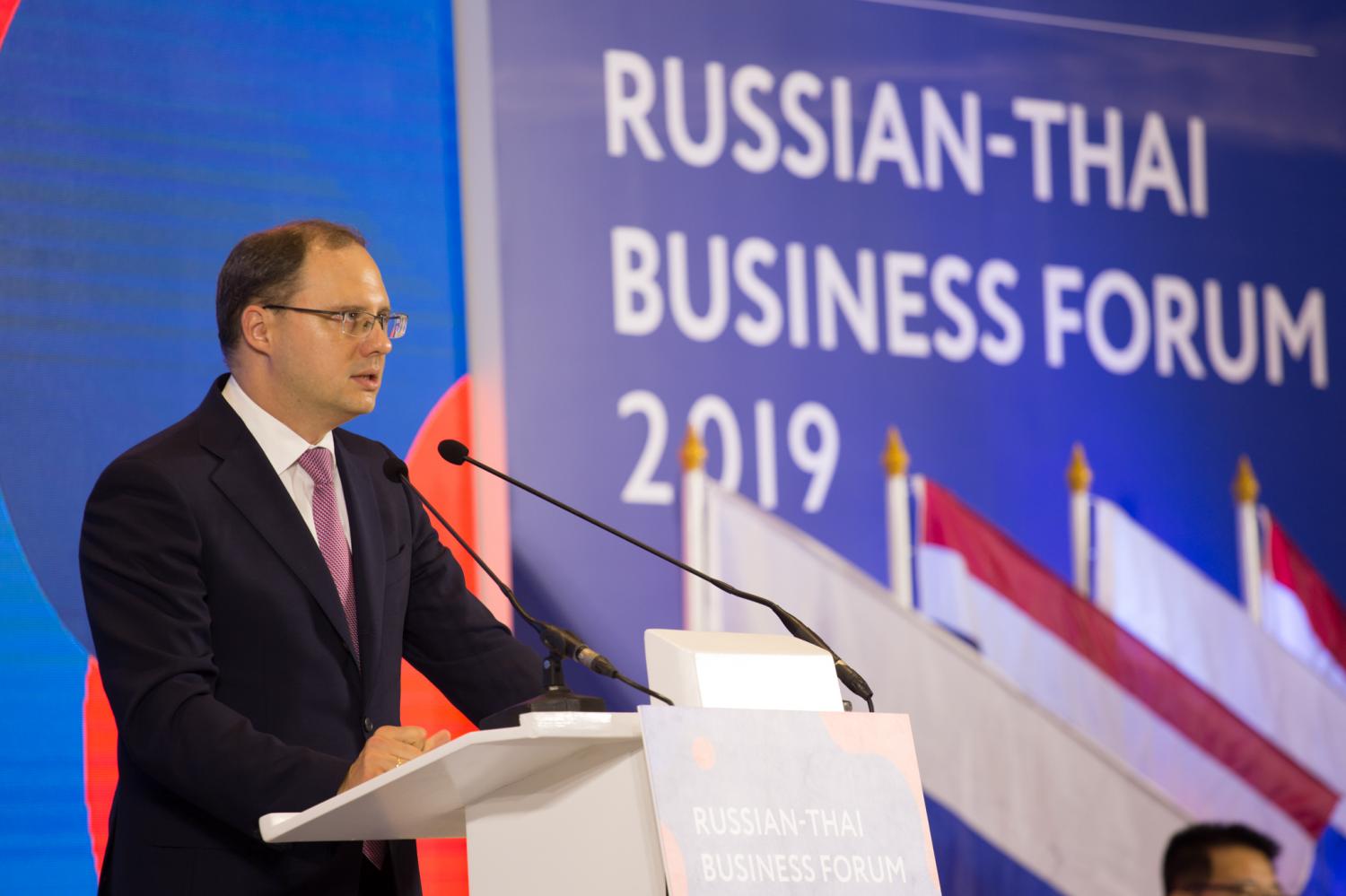
Russia sees Thailand as a gateway to Asean and it wants to improve bilateral relations, especially in the energy and mineral resources sectors, says Alexey Gruzdev, deputy minister of economic development for the Russian Federation.
There is also a special interest in the development of Thailand's Eastern Economic Corridor (EEC) under a public-private partnership (PPP) model.
"We see great potential here in Asean for political, economic and cultural relations. That is why we are here, because Thailand is one of the main countries in this region," he said at the 2nd Russian-Thai Business Forum in Bangkok last week.
"We believe energy and mineral resources continue to be key sectors, given that Russia is a leading exporter of oil and gas.
"Thailand is a rapidly developing country with a lot of ongoing projects that require resources and we are ready to develop this relationship."
According to Thailand's Energy Policy and Planning Office, the country imported around 1.4 million barrels of crude oil per day in 2018, compared with around 643,000 barrels in 2000.
Thailand imports 249,000 barrels of crude oil equivalent per day in gas, compared with around 29,500 barrels per day in 2000.
Deloitte's Global Energy Team last year reported that electricity generation in Thailand is highly dependent on natural gas, with 60% of electricity generated from natural sources in the Gulf of Thailand, Myanmar, and imported liquid natural gas (LNG).
Renewable energy contributed only 9% of total power generation in 2018.
The professional services network also noted that Thailand has LNG long-term contracts with Qatar at 2 million tonnes per annum (MTPA) followed by Malaysia's Petronas (1.2MTPA), British-Dutch Shell (1MTPA), and Britain's BP (1MTPA), while supply brought from overseas is "rising rapidly".
According to BP, Russia's gas production grew 5.4% to 33 billion cubic metres in 2018, the second largest increase in volume following the US.
Russia also remained the world's largest exporter of oil and gas. Yet energy imports from Russia to Thailand are still low relative to other countries.
But the energy sector is not the only area the Russian Federation would like to develop.
The Russian embassy in Thailand said there was a bilateral trade volume of US$1.85 billion (56.6 billion baht) from January and September 2018, with Russian exports mostly crude oil and other raw energy resources (44.3%), metals and metal parts (17.8%), chemical industry products (16.7%), and machines, equipment and vehicles (13.0%).
Thai exports were mainly machines, equipment and vehicles (62.4%), chemical industry products (16.1%) and food and agricultural commodities (9.6%).
"Our main mission is to find other sectors where we can develop this bilateral relationship, including artificial intelligence and machinery. By machinery I do not only mean weapon-hauling stock, memory cards and special vehicles, but also the shipbuilding industry," said Mr Gruzdev.
"Other sectors include innovative fields such as biotechnology, pharmaceuticals and agriculture, which is very crucial to Thailand."
In agriculture, he believes there is mutual interest as Russia is becoming a supplier of wheat products and is entering the meat sector, while Thailand is a major exporter of rice, rubber and canned foods.
The development of the digital economy in Thailand has caught Russia's attention as the country is looking to increase cooperation in the exchange of information technology (IT) and information communication technology (ICT).
Last year, Thailand shipped about $1 billion worth of goods to Russia and imported about $2 billion, which together contributed to a trade volume of about $3.5 billion in 2018, said Kriengkrai Thiennukul, the FTI's vice-chairman and the federation's point man on relations with Russian businesses.
The target for trade between the two countries remains set at $10 billion per year by 2020.
Thailand is looking for Russian cooperation in the IT sector, especially to build new S-curve industries in the EEC scheme.
"We are looking to invest heavily into the EEC, especially on infrastructure and industrial development," said Mr Gruzdev.
"I know there is interest from China and Japan, but we are also doing a lot to promote the project in Russia. We have discussed the venture with our joint economic commission and have visited the EEC as well."
Russian companies are interested in investing in the EEC's railway rolling stock and airport infrastructure, such as the air navigation, electronic and security systems, and are ready to make offers to Thai representatives, he said.
"We are considering the project in detail and some companies are already involved in the negotiation process," said Mr Gruzdev.
"We see immense potential for Russian companies in the EEC in terms of supplying the technology and products. Companies can become investors and subcontractors for big infrastructure projects.
"We are in discussions with some PPP projects with our Thai partners as well."
Given the Russian Federation's policy of de-dollarisation, the group is hoping the rouble and baht will be the major currencies used for bilateral trade.
This is because it is "more convenient" and can help Russia "escape the challenges it is suffering from", he said.
"We believe trade should be direct and no third party should be a part of this deal. This is also a matter of convenience and efficiency," said Mr Gruzdev.
"More than 90% of turnover is done in US dollars and we need the infrastructure to support direct rouble-to-baht payments. The banking industry needs to be more active with direct accounts and our stock exchanges need to start selling and buying in rouble and baht. We are working towards that."
He revealed his office already asked the Russian central bank to "pave the way" for such exchanges and once it is more convenient, "we will witness the rise of the rouble and baht in trade turnover".